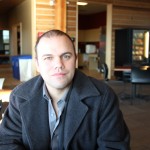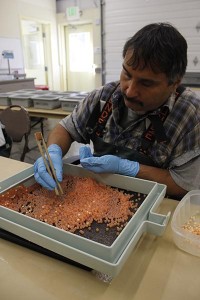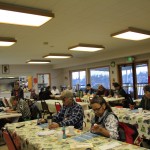The Nature Conservancy brought people together in 2012 to conserve and restore the lands and waters that support our quality of life.
Press Release, Robin Stanton, The Nature Conservancy in WashingtonSeattle, WA | January 03, 2013
In 2012 The Nature Conservancy’s Washington chapter restored estuaries, restored forests, created new community collaborations, plucked derelict fishing gear from coastlines and brought science to bear on some of the most pressing problems facing us. From the Washington coast to Puget Sound to east Cascades forests and eastern Washington sagelands, The Nature Conservancy brought people together in 2012 to conserve and restore the lands and waters that support our quality of life.
Here are highlights of how donor support helped people and nature thrive in Washington in 2012.
Puget Sound
The Conservancy completed two restoration projects in Port Susan Bay, restoring estuary habitat for salmon and other marine life and improving flood control measures for neighboring farmers. These two projects—at Port Susan Bay Preserve and at Livingston Bay—improved more than 4,000 acres of tidelands in the vitally important Skagit and Stillaguamish River deltas.
Protecting and restoring shorelines is a vital part of restoring Puget Sound and supporting communities throughout the region. The Conservancy’s work supports the Puget Sound Agenda developed by the Puget Sound Partnership.
Washington Coast
It was a big year for restoration at the Conservancy’s Ellsworth Creek Preserve, at Willapa National Wildlife Refuge and on the Conservancy’s property on the Clearwater River, a tributary to the Queets. Funding from the jobs bill passed by the state Legislature last spring enabled the Conservancy to permanently remove 3 miles of old, hazardous road in the Ellsworth Creek Preserve while improving and upgrading an additional 4 miles. The improved roads enabled hired crews to do restoration thinning operations on 200 acres of former tree farm. Thinning the Douglas-firs makes room for spruce, cedar and hemlock to grow.
Locally hired crews and volunteers planted 11,000 trees at Ellsworth and on the adjacent Willapa National Wildlife Refuge, and another 8,000 trees on the Clearwater.
The Conservancy led establishment of the Washington Coast Marine Advisory Council to give local communities a voice in marine and coastal management.
The Conservancy worked with partners to remove 32 derelict nets in Grays Harbor and implemented a pilot derelict crab pot removal on the coast, retrieving 98 pots.
East Cascades Forests
Conservancy scientists published a first-of-its-kind study of how forests in central and eastern Washington have changed over the last 100 years, a study that sets the stage for science to guide forest restoration efforts so they’ll be effective.
As part of the Tapash Sustainable Forests Collaborative, the Conservancy restored 746 acres of forest west of Yakima, improving wildlife habitat and reducing the threat of catastrophic fires. Locally hired crews also removed 13 miles of high-risk roads in the region.
With partners, the Conservancy launched a new collaborative, the Northeast Washington Forest Vision 2020 Collaborative, to improve management on 900,000 acres of forestlands near Colville.
Sagelands
The Conservancy’s 35,000-acres Moses Coulee Preserve is a laboratory for managing sage lands in central Washington. The Conservancy and partners are continuing an experiment on a biological control for cheatgrass, an invasive weed that has devastated rangelands in the western United States. Other ongoing conservation projects include banding and monitoring migrating songbirds, surveying the region’s diverse bat populations and restoring sagelands habitat.
Statewide:
Four young men from Tacoma’s Science and Math Institute (SAMI) spent part of the summer counting bats, looking for marbled murrelets, banding songbirds and overcoming their dislike of spiders as part of The Nature Conservancy’s signature youth program, Leaders in Environmental Action for the Future (LEAF). The Washington chapter joined the program in 2011, hosting teens from New York, where it started. In 2012, the chapter hosted teens from right here in Washington for this paid internship.
Washington’s coastal treaty tribes—the Hoh, Makah and Quileute Tribes and the Quinault Indian Nation—hosted the inaugural First Stewards climate symposium in Washington, DC. The Conservancy and NOAA’s Office of National Marine Sanctuaries were partners in the four day event, which brought together indigenous communities with scientists and governmental and non-governmental organizations to examine the impacts of climate change on indigenous coastal cultures and explore solutions based on millennia of traditional ecological knowledge.
International
The Nature Conservancy is an international organization, focused on finding local solutions to global challenges. The Washington chapter is connected to the Conservancy’s work around the world. In 2012, the chapter hosted Aurelio Ramos, the Conservancy’s director of conservation programs for Latin America, as he helped to develop conservation strategies for Puget Sound, for Washington’s eastern sagelands, and for temperate rainforests from Washington to Alaska. And the Washington chapter supported the Southern Andes program with science and geographic information staff, and assisted the Coral Triangle Center in Indonesia to develop its own membership program.
New Leadership
Capping off the year of conservation work, The Nature Conservancy welcomed Mike Stevens as the new Washington state director. Stevens arrived on Nov. 26, and in his first month he has visited all major program sites throughout the state.













